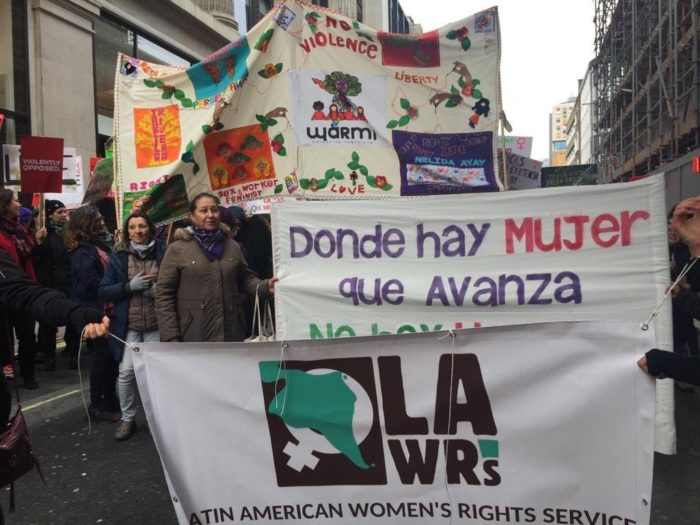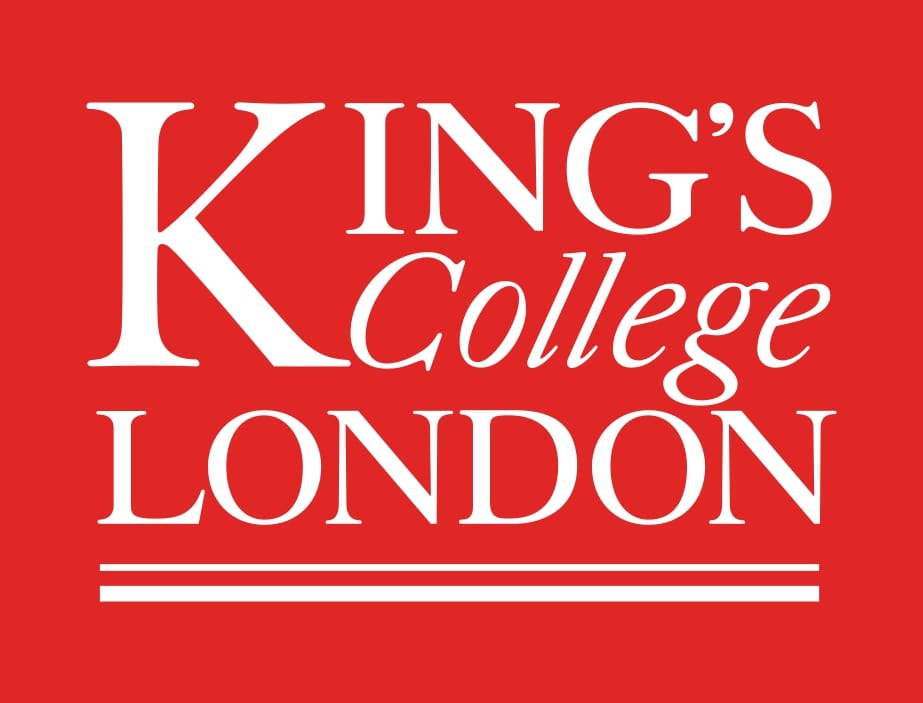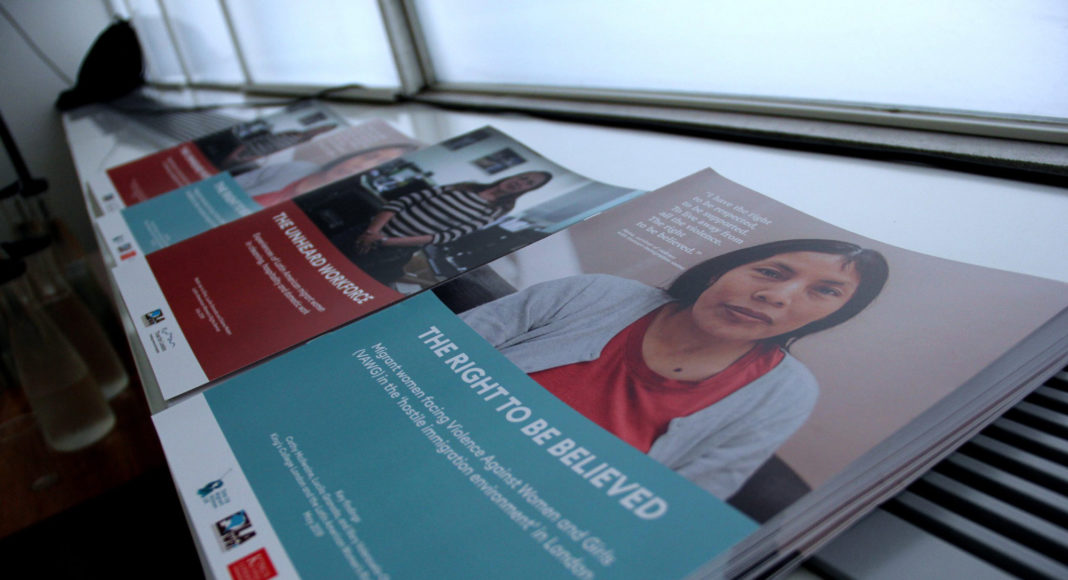As part of our ongoing collaborative Women Resisting Violence project in partnership between LAB and King’s College London, we are spotlighting Latin American grassroots campaigns and organisations that counter violence against women and girls. Read on to learn about the Latin American Women’s Rights Service, who will feature in the upcoming Women Resisting Violence podcast.
Organisations | LAWRS
The Latin American Women’s Rights Service (LAWRS) is a feminist human rights organisation, run by and for Latin American women living in the UK. It was founded in 1983 by Latin American women in response to the lack of culturally sensitive welfare support available for migrant and refugee women from Latin America.
Initially LAWRS set up an advice, information, and advocacy service to inform Latin American women of their rights and provide services in a culturally, linguistically and gender-specific setting. Over time, LAWRS expanded and developed its services and today it has a holistic, wide-ranging approach supporting approximately 5,000 women every year.
Since LAWRS was set up, the Latin American community in the UK has grown and today numbers at approximately a quarter of a million people – 145,000 of whom live in London. Currently the largest national groups are Brazilians, Colombians, Ecuadorians, and Peruvians. Although many are highly qualified and skilled, language barriers and a lack of understanding of the employment system in the UK mean that women are often forced into low-skilled and low-paid jobs such as cleaning, where conditions are often exploitative, with long-hours, and many women experiencing regular violations of labour rights, abuse and exploitation.
Approach to tackling VAWG
Many women in the Latin American community have experienced gender-based violence in their home countries and as migrants and refugees living in the UK, they are vulnerable to abuse and exploitation in both the domestic and labour spheres. For these reasons a key priority for LAWRS is to address different forms of violence against women (VAWG), such as domestic violence, sexual violence, harmful practices, trafficking for sexual exploitation, harassment and abuse in the workplace.
LAWRS has taken a holistic approach: first, they support women survivors by helping them to find safety and protection and to start rebuilding their lives free from violence. They also offer specialist counselling, legal and practical advice, and have formed mutual support groups which help to build survivors’ confidence, empowerment and healing. LAWRS staff liaise with the police and social services, and are active in various VAWG forums, advocating for improved responses to support migrant victims of violence. LAWRS also provides training for statutory agencies and for professionals to improve the identification and responses to VAWG as it affects Latin American women.
LAWRS’ counselling and psychotherapy service provides culturally sensitive support in Spanish and Portuguese for women and girls over 16 years old who are survivors of different forms of violence. The therapeutic approach used is rooted in feminist principles, with a focus on empowering and enabling women to reach their own potential to recover from abuse.
LAWRS also runs workshops and group activities to increase awareness of women’s rights and provide a space for women to discuss sensitive topics like sexual violence, coercive control, domestic abuse and victims’ rights, sexism and forced marriage, among other topics. LAWRS also works on prevention of violence with young people through the Sin Fronteras programme (see below).
Other Services
LAWRS offers advice, advocacy and casework support on housing, welfare benefits and debt, as many women who approach LAWRS are facing multiple and complex problems. The crisis in housing, austerity measures and reform of welfare benefits – as well as lack of access to legal aid- push migrant women into destitution and at risk of becoming homeless.
Many of the service users are single mothers and the main carers of children, so providing free childcare is crucial to enable them to access their services. Prior to the office being closed due to Covid, free crèche support was offered to women with children who were accessing all LAWRS services (and will resume once the drop-in service starts up again).
LAWRS runs a volunteering programme to provide work experience, regular supervision, training and development opportunities that enable Latin American migrant women to increase their opportunities in the job market. At the same time, the contribution of the volunteer workers is key in enabling LAWRS to deliver excellent quality services and programmes.
Labour Abuse
As many Latin American women work in the cleaning, domestic work and hospitality sectors, LAWRS carried out research and analysed the cases of women affected by different types of labour abuse and exploitation in these sectors. This data supported their advocacy work to inform and influence government agencies, public bodies, private companies, and employment agencies and other stakeholders. Their report shares the experiences of women working in precarious sectors, and supported advocacy on migrant women workers’ labour rights.
Prior to the Covid pandemic, LAWRS ran a Women Workers Group with women employed as cleaners and in domestic work, providing information sessions, workshops, and training to increase their ability to advocate for themselves. Members of the group participated as speakers in roundtables, conferences, academic publications and in the media. As a result of the training one of the women from the group felt confident to speak about her work experiences at an event organised by the Equality and Human Rights Commission, which was attended by the Chair of the UN Committee on Economic, Social and Cultural rights and numerous stakeholders, including representatives from the Ministry of Justice.
Advocacy and Community Activism
LAWRS carries out policy, advocacy, and campaigning work to uphold the rights of Latin American migrant women focused on VAWG survivor’s rights, labour rights, and migrant women’s rights. Their work is based on evidence collected through direct contact with migrant women who are directly affected by the issues, and who are supported and empowered by LAWRS to engage in policy and campaigning work to speak up for themselves and influence change.
Women with insecure immigration status are frequently denied access to safety and justice, and find themselves trapped in situations of violence, fearing being detained, deported or made destitute. In response to this, LAWRS launched the Step Up Migrant Women UK campaign (SUMW) to secure safe reporting mechanisms for women victims of crime with insecure immigration status.
LAWRS took further steps to engage with the Latin American community through a Community Activism project which began in March 2018, offering training and awareness raising. The project reached out to Latin American migrant women working in contract cleaning, hospitality, catering and domestic work.
In the first year of the project, two groups of women were formed: a workers’ group and a survivor/women’s empowerment group. The tough reality lived by Latin American migrant women is largely invisible to policy makers and the project therefore also aimed to ensure that migrant women’s voices are heard on issues that greatly affect their lives. Women directly affected by violations of worker’s rights, harassment and domestic violence were supported to participate in advocacy activities that LAWRS was undertaking. Firstly, through participating in skills training and confidence-building activities, and then by speaking out at events in the public arena where they gave testimonies and called for migrant women’s rights to be respected.
WARMI
In the second year of the project (2019), women participants from both groups took the initiative to form a women’s collective which had a core group of 30 members. They called this collective the WARMI and developed a logo for it – a symbol of a tree representing women’s struggles. Maria, a WARMI member says:
The WARMI collective grew out of these discussions. Warmi is a Quechua word that means a powerful woman, who loves her family, a brave warrior, and for us it means fighting, respect and solidarity, of being united. And we hope the WARMI group continues to grow.
WARMI is also an acronym for Women Activist Revolutionary Migrant Intersectional feminist, chosen by the members of the collective. The formation of the WARMI Collective was as a result of the training, trust and affection that grew between the participants, as well as their political awareness which developed following the community activism training.
I always go to the workshops, we have had many different ones – on our rights, self-esteem, psychology, yoga – I like this space and I learn a lot here. Learning about women’s rights and empowerment have helped me the most, it is important to be treated with respect and know that we can contribute too.
As the project progressed, the WARMI women became more confident and took greater control of their learning and developed their sense of identity as a separate group. Group members voted on the proposed activities and the number of workshops, the themes that would be covered and the skills they wanted to learn for their personal and professional development.

Sin Fronteras
LAWRS also supports young Latin American women by providing a space where they can develop their own potential, agency, and aspirations. In 2015 LAWRS launched the Sin Fronteras (No Limits) project to support young women through activities that combined arts and discussions covering topics such as gender roles, stories of migration, hate crime, mental health, and women’s rights. Some of the participants were involved in producing a short documentary where they explored and discussed matters affecting their lives, and which included stories of migration, age discrimination, and community spaces in London.
The project also organised outings to arts exhibitions, and LGBT+ and women’s rights related events. No Limits members also engaged in community events, leading and joining demonstrations and campaign actions on issues that mattered to them as young migrant women. Sin Fronteras used the arts as a means of empowerment for young women to learn new skills, access new experiences, expand their aspirations, build leadership skills, and support other young women to engage in action for change. The project activities were chosen, designed, and led by the participants.
Covid-19
During the Covid crisis, LAWRS was forced to close its offices, but they continue to offer services remotely and there is a dedicated helpline women can call. The tri-lingual website has helpful information about COVID and contacts which women can access for support.
LAWRS’ work and their Step Up Migrant Women campaign features in episode 2 of the Women Resisting Violence podcast, to be released December 2, 2021.




